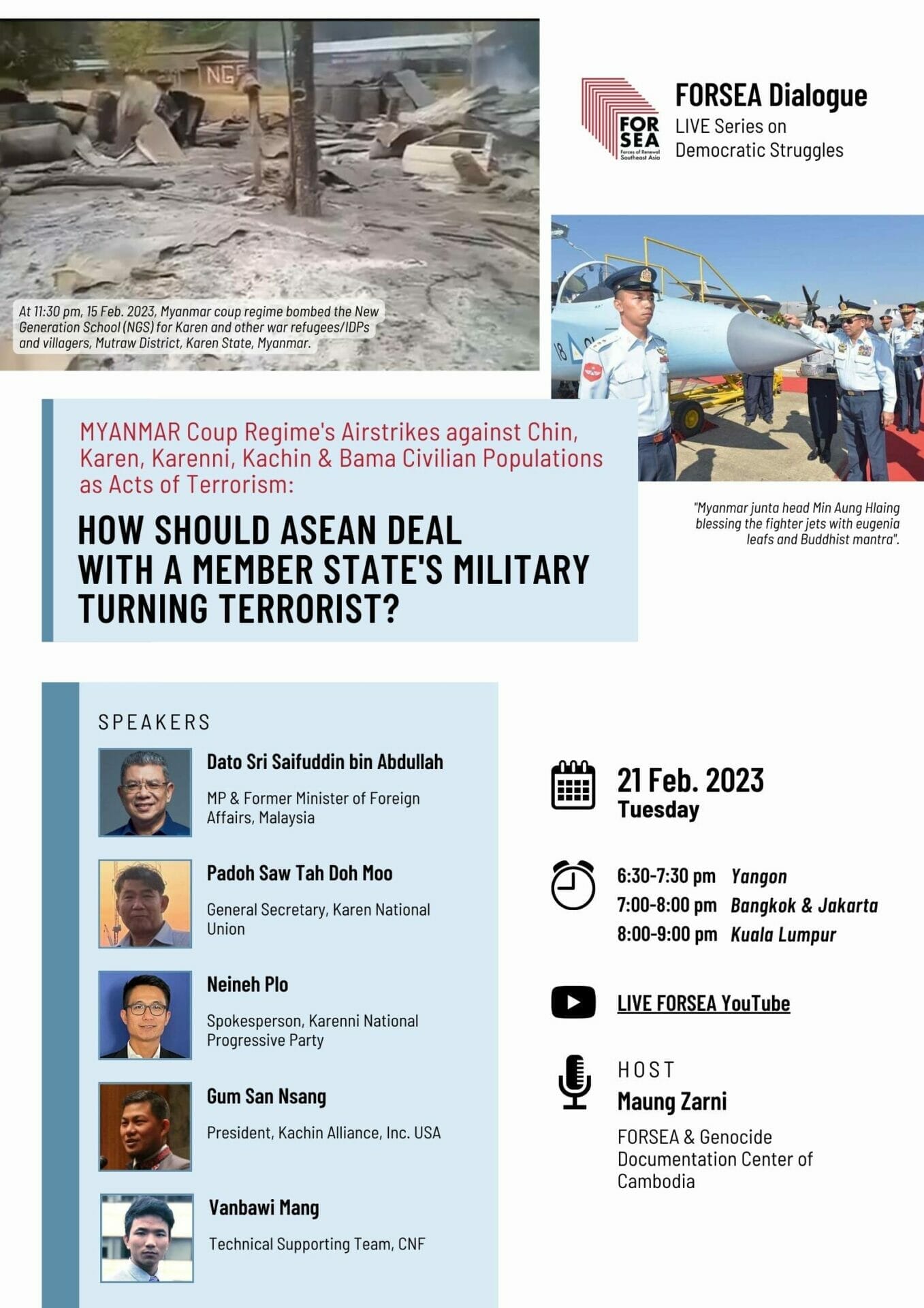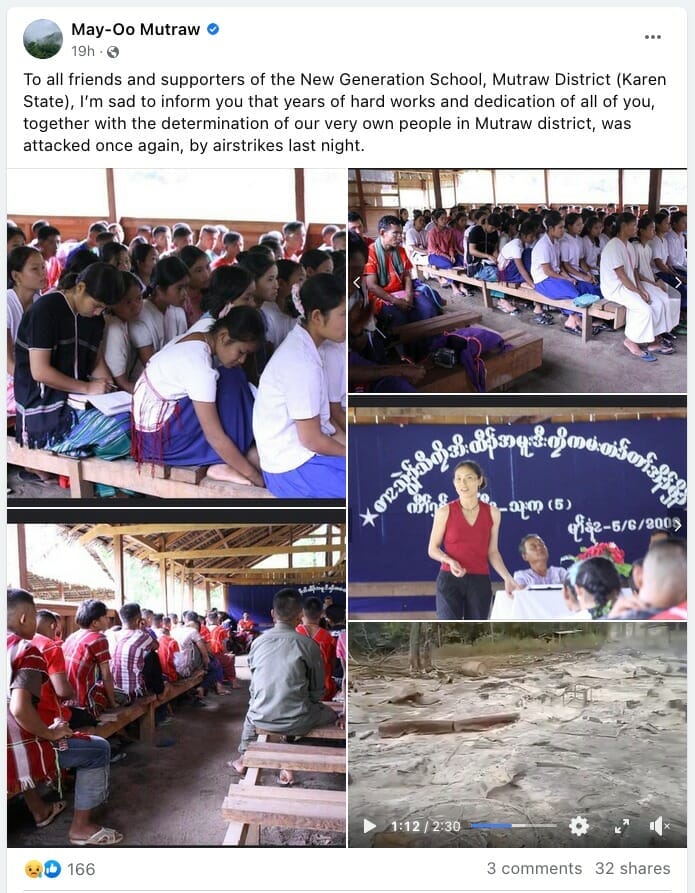FORSEA Dialogue
The coup leader Senior-General Min Aung Hlaing’s use of violent attacks from the air perfectly fits the definition of “domestic terrorism” developed by the United States Federal Bureau of Investigation (FBI). It reads:
Domestic terrorism: Violent, criminal acts committed by individuals and/or groups to further ideological goals stemming from domestic influences, such as those of a political, religious, social, racial, or environmental nature.
On 21 February evening in Southeast Asia, FORSEA is hosting the first dialogue LIVE on the subject of a national armed forces resorting to targeted, precision airstrikes against civilian populations at home.
21 February 2023 (Tuesday)
6: 30 pm – 7: 30 pm Yangon |7:00 – 8pm Bangkok | 8:00 – 9:00 pm Kuala Lumpur, Manila & Singapore
LIVE
Distinguished Guests:
- Dato’ Sri Saifuddin bin Abdullah, MP (since 2018) and former Minister of Foreign Affairs, Malaysia
- Padoh Saw Ta Doh Moo, General Secretary, Karen Nation Union (established in 1948) and a founding member of Myanmar National Unity Consultative Committees
- Neineh Ploh, Spokesperson, Karenni National Progressive Party
- Salai Van Bawi Mang, Member, Chin National Front, Technical Team
- Gum San Nsang, President, Kachin Alliance, Inc., USA & Secretary of Kachin Political Interim Coordination Team (KPICT)
- Host: Maung Zarni, Co-founder, FORSEA and Fellow, (Genocide) Documentation Center of Cambodia

The State Administrative Council, or Myanmar’s coup regime, established on 1 February 2021, has been deploying Myanmar Air Force fighter jets and gunship helicopters to deliberately strike “soft targets” in the conflict regions of Myanmar. The air force jets have launched missiles and dropped bombs with increasing frequency and with progressively greater precision against civilian populations and their physical infrastructures.
Myanmar Armed Forces Russian, Chinese and Pakistani-supplied fighters and bombers have struck civilian gatherings in Kachin State, war refugee camps in Chin State on the border with India’s Mizoram State, the mountainous state of Karenni people, Karen villages across the borders from Thailand and villages in the Burmese Buddhist heartland of the Dry Zone.
Most recently, at 11:30 pm on 15 February – 3 days after the coup regime held the annual ceremony in its fortified capital Naypyidaw, commemorating the establishment of Myanmar as a Union of multi-ethnic nations – its fight jets bombed a sizeable village school built by Naw May Oo, a former Karen refugee from USA with volunteer teachers and donations from Karen diaspora and other individual philanthropists.
The school buildings were clearly marked “New Generation School” (NGS). The school catered to the educational needs of Karen and other war-fleeing Myanmar Internally displaced persons (or IDPs), who have sought refuge and protection under the Karen National Union and its military wing Karen National Liberation Army.
She wrote on her Facebook page the morning after the mid-night bombing of her refugee school:
To all friends and supporters of the New Generation School, Mutraw District (Karen State), I’m sad to inform you that years of hard works and dedication of all of you, together with the determination of our very own people in Mutraw district, was attacked once again, by airstrikes last night.
To see the videotaped images of the bombed out school site and the schools with students and teachers before the airstrikes, please see below:
In a private dinner conversation in Washington two decades ago Edward Luttwak, the famed author of Coup d’Etat: A Practical Handbook, described what he considered a terrorist organization, “an organization that deploys violence against civilians, but does not have an air force”, to Dr Maung Zarni of FORSEA. Myanmar coup regime has turned Luttwak’s crude definition on its head.
The 45-paged document classified SECRET – which contains detailed minutes of the 7-hour long “counter-terrorism” meeting held at Myanmar Police Headquarters in Naypyidaw on 23 December 2022 – states specifically the need for increasing air strikes (across resistance-strong and ethnic minority regions). Several dozen security officials were reporting orally to the regime’s Home Affairs Minister Lt-General Soe Htut who presided over the internal Security meeting. And the document recorded that out of a total of 14 regions that make up Myanmar (called “states and divisions”) resistance networks are very active in 12. Importantly, they openly admitted both significant human intelligence failures and poor electronic surveillance over resistance networks, particularly in the ethnic minority-controlled conflict regions, which is more than 50% of the country’s territories. The report also noted that the SAC regime troops are finding the rugged physical terrains extremely difficult for effective military campaigns, hence frequent call-ins for air strikes.
FORSEA brings together a group of Myanmar who have superb expertise of their regions, including the regime’s deadly air strikes against civilian communities and war refugees/IDPs who flee their villages and homes. They will be joined by a former ASEAN leader who has emerged as a strong voice supporting Myanmar peoples’ struggle for human rights and freedom.
On 21 February evening in Southeast Asia, FORSEA is hosting the first dialogue LIVE on the subject of a national armed forces resorting to targeted, precision airstrikes against civilian populations at home.
21 February 2023 (Tuesday)
6: 30 pm – 7: 30 pm Yangon |7:00 – 8pm Bangkok | 8:00 – 9:00 pm Kuala Lumpur, Manila & Singapore
LIVE
More background Information:


